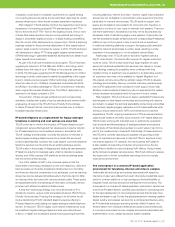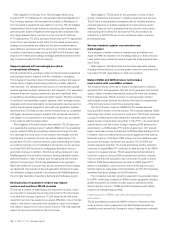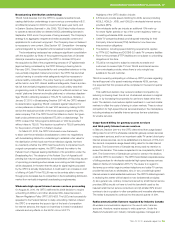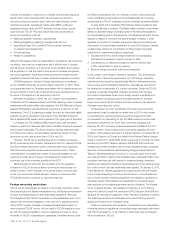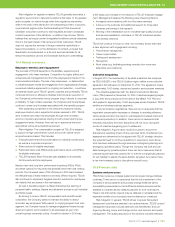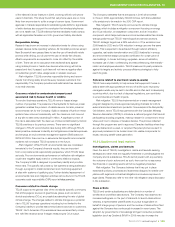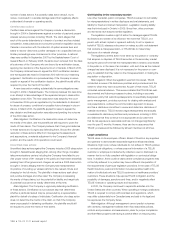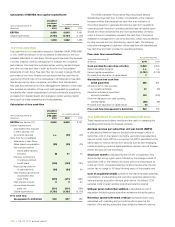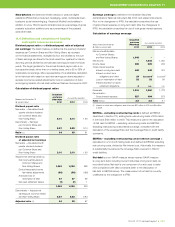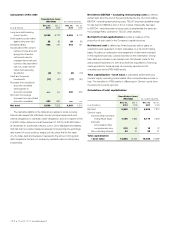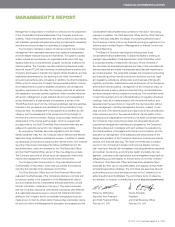Telus 2010 Annual Report Download - page 108
Download and view the complete annual report
Please find page 108 of the 2010 Telus annual report below. You can navigate through the pages in the report by either clicking on the pages listed below, or by using the keyword search tool below to find specific information within the annual report.104 . TELUS 2010 annual report
and foreign external advisors, to provide tax advice and to assess foreign
tax issues and risks. This team is also responsible for the specialized
accounting required for income taxes, and accordingly, is charged with
maintaining state-of-the-art knowledge of tax accounting developments
and the implementation of such relevant measures, as required.
The transactions of the Company are under continual review by the
Company’s Taxation department whereby transactions of an unusual or
non-recurring nature, in particular, are assessed from multiple risk-based
perspectives. Tax-related transaction risks are regularly communicated
to and reassessed by tax counsel as a check to initial exposure assess-
ments. As a matter of regular practice, large and international transactions
are reviewed by external tax counsel, while other third-party advisors
may also be engaged to express their view as to the potential for tax
exigibility. In 2010, the Company completed phase one of its three-phase
enterprise-wide program to review its existing international structure,
systems and processes and to develop a future mode of operation that
will mitigate its regulatory, legal and tax risks as it continues international
expansion. Additional adjustments will continue into 2011 to take into
account business changes. In 2010, the Company continued to work on
expanding the capability of its U.S. automated regulatory and tax billing
system for additional products and services that is expected to be com-
pleted in 2011. The Company engages external counsel and advisors as
appropriate to provide advice and to prepare or review returns to enable
the Company to comply with tax laws in the jurisdictions outside of
Canada in which it has operations of any significance. The advice and
returns provided by such advisors and counsel are reviewed for
reasonableness by TELUS’ internal Taxation team.
10.8 Health, safety and environment
Team member health, wellness and safety
Lost work time resulting from the physical injury or psychological
illness of TELUS team members can negatively impact organizational
productivity and employee benefit costs.
Risk mitigation: To minimize absences in the workplace, TELUS
supports a holistic and proactive approach to team member health by
providing comprehensive wellness, disability, ergonomic and employee
assistance programs. To promote safe work practices, the Company
has long-standing training and orientation programs for team members,
contractors and suppliers who access TELUS facilities. Wellness
programs include training for managers and access to short-term and
long-term counselling for individual team members and/or teams.
However, there can be no assurance that these safety and health
programs and practices will be effective in all situations.
Radio frequency emission concerns
Some studies and various media reports have asserted that radio
frequency emissions from wireless handsets may be linked to
certain adverse health effects. There can be no assurance that future
health studies, government regulations or public concerns about the
health effects of radio frequency emissions will not have an adverse
effect on the business and prospects for TELUS. For example, public
concerns could reduce subscriber growth and usage, and increase
costs as a result of modifying handsets, relocating wireless towers, and
addressing incremental legal requirements and product liability lawsuits.
TELUS continues to monitor developments in this area.
Risk mitigation: Evidence in the scientific community, as determined
and published in numerous studies worldwide, supports the conclusion
that there is no demonstrated public health risk associated with the
use of wireless phones. These include a study published in the Journal
tax positions that are more likely than not of being sustained upon
examination on an issue-by-issue basis. The benefit is measured at
the largest amount with greater than 50% probability of being realized.
The assessment of the likelihood and amount of income tax benefits,
as well as the timing of realization of such amounts, can materially affect
the determination of net income or cash flows. As noted in Section 1.5
Financial and operating targets for 2011, TELUS currently expects to make
cash income tax payments, net of recoveries, of approximately $130 to
$180 million. The 2011 blended statutory income tax rate is expected to
be 26.5 to 27.5%. These expectations can change as a result of changes
in interpretations, regulations, legislation or jurisprudence.
The timing concerning the monetization or realization of future income
tax accounts is uncertain, as it is dependent on future earnings of TELUS
and other events. The amounts of future income tax liabilities are also
uncertain, as the amounts are based upon substantively enacted
future income tax rates in effect at the time, which can be changed by
governments. The amounts of cash tax payments and future income
tax liabilities are also based upon the Company’s anticipated mix
of revenues among the jurisdictions in which it operates, which is also
subject to change.
The audit and review activities of the Canada Revenue Agency and
other jurisdictions’ tax authorities affect the ultimate determination of
the actual amounts of commodity taxes payable or receivable, income
taxes payable or receivable, future income tax liabilities and income
tax expense. Therefore, there can be no assurance that taxes will be
payable as anticipated and/or that the amount and timing of receipt or
use of the tax-related assets will be as currently expected. Management’s
experience indicates the taxation authorities are more aggressively
pursuing perceived tax issues and have increased the resources they
put to these efforts. The economic recession that ended in 2009 has
only served to exacerbate such aggressive practices.
In order to provide comprehensive solutions to primarily Canadian-
based customers operating in foreign jurisdictions, the Company has
entered into further arrangements for the supply of services in such
foreign jurisdictions, thus exposing itself to multiple forms of taxation.
In 2008, the Company continued to expand its activities into
the United States and other foreign jurisdictions including the United
Kingdom, Philippines, Panama, Guatemala, El Salvador and Barbados.
In 2009, as part of its operational efficiency program, the Company
increased its offshoring of certain business processes to the Philippines
and India. In the U.S., federal, state and local jurisdictions have created
varying complex regimes for income, revenue, sales and use, and
property taxes. The number and variation of such regimes in the U.S.
jurisdictions where the Company has transactions cause additional
financial risk to the Company. Generally, each foreign jurisdiction has its
own taxation peculiarities in the forms of taxation imposed (such as
value-added tax, gross receipts tax or income tax) and its own legislation
and tax treaties with Canada, as well as currency and language differ-
ences. Notwithstanding the usual differences, the telecommunications
industry has unique issues that lead to uncertainty in the application
or division of tax between domestic and foreign jurisdictions. Accordingly,
TELUS’ foreign expansion activities have increased the Company’s
exposure to tax risks, from both financial and reputation perspectives.
Risk mitigation: The Company maintains an internal Taxation depart-
ment composed of professionals who are trained and educated in taxation
administration and who maintain an up-to-date knowledge base of new
developments in the underlying Canadian law, its interpretations and
jurisprudence. TELUS also has an experienced international team with
knowledge of U.S. and other foreign tax laws, supplemented by U.S.



